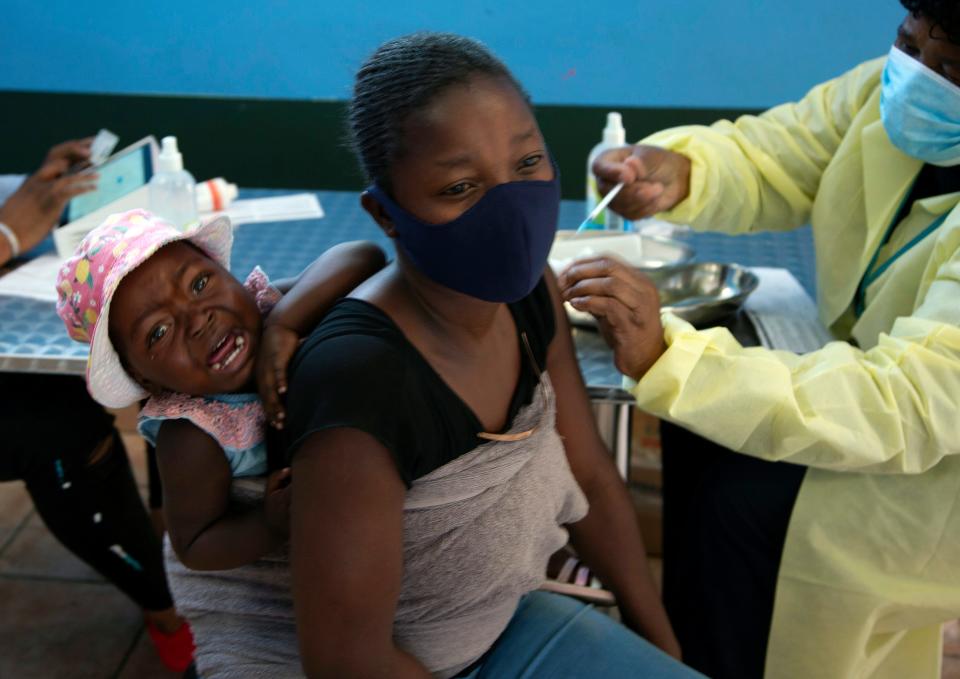New COVID variant dubbed 'omicron' by WHO; vaccine makers already have contingency plans: Latest updates
A COVID-19 variant spreading in South Africa was dubbed "omicron" and classified a "variant of concern" by the World Health Organization on Friday, as the U.S. and other nations reacted to the newly discovered variant with travel restrictions.
Experts with the World Health Organization met Friday to assess the variant, which appears to have a high number of mutations in the virus’ spike protein, prompting worries about how easily it will spread. While good data on the risks of omicron is likely weeks away, the organization cited early evidence suggesting an increased risk of reinfection.
The U.S. said it will restrict travel from South Africa, as well as Botswana, Zimbabwe, Namibia, Lesotho, Eswatini, Mozambique and Malawi, according to a statement from senior officials from the Biden administration.
LATEST UPDATES: World reacts to omicron much faster than previous variants; vaccine contingency plans in motion: Latest COVID-19 updates
The policy will take effect Monday, and President Joe Biden said the new rules mean “no travel” to or from the designated countries, except for returning U.S. citizens and permanent residents who test negative.
Infection rates in South Africa have "increased steeply," coinciding with the detection of the variant, according to a Friday statement from the WHO. The first omicron case was reported to the agency from South Africa on Nov. 24, and the number of cases of the variant are increasing in almost all South African provinces, the WHO said.
While omicron is now in the same category as the delta variant, the extent of the public health threat the new variant will pose is unclear. The beta variant was classified a variant of concern but did not spread as far as initially expected.
The WHO urged countries to increase surveillance of omicron cases and genome sequencing efforts to better understand its potential impact.
Biden said the emergence of omicron emphasizes the importance of vaccinations and urged Americans to get their booster shots as soon as possible.
The new variant has also been found in Botswana and Hong Kong in travelers from South Africa, according to Joe Phaahla, the nation's health minister. Phaahla said the variant has seen rapid spread in Gauteng, the country’s most populous province.

Several nations, including Germany, Italy, the United Kingdom, the Netherlands, the Czech Republic and Japan, have responded to news of the variant by moving Friday to restrict air travel from several southern African countries. The European Union, which is made up of 27 nations, is also recommending a ban on flights from southern African countries, despite WHO officials warning against rash decisions.
More about the newly discovered variant: What to know about the new COVID-19 variant in South Africa
Also in the news:
►Israel announced Friday it detected the country's first case of the newly discovered omicron variant in a traveler returning from Malawi. The traveler and two other people who are suspected to be infected with the variant have been placed in isolation.
►Stocks sank Friday, with the Dow Jones Industrial Average briefly falling more than 1,000 points, as a new coronavirus variant first detected in South Africa appeared to be spreading across the globe. Investors were uncertain whether the variant could potentially reverse months of progress at getting the COVID-19 pandemic under control.
►Czech President Milos Zeman was admitted to a hospital late Thursday after testing positive for COVID-19.
►The number of air travelers this week is expected to approach or even exceed pre-pandemic levels, and auto club AAA predicts 48.3 million people will travel at least 50 miles from home over the holiday period.
📈Today's numbers: The U.S. has recorded more than 48 million confirmed COVID-19 cases and more than 776,000 deaths, according to Johns Hopkins University data. Global totals: More than 260 million cases and more than 5.1 million deaths. More than 196 million Americans — roughly 59.1% of the population — are fully vaccinated, according to the CDC.
Keep refreshing this page for the latest news. Want more? Sign up for USA TODAY's Coronavirus Watch free newsletter to receive updates directly to your inbox and join our Facebook group.
Omicron's impact on vaccines unclear, but contingency plans already rolling out
Health experts have said it will likely be weeks before the world has good data about how omicron may reduce the effectiveness of current vaccines, but Moderna has already announced a three-point strategy to combat the new variant.
Omicron's mutations could possibly reduce current vaccines' effectiveness, but are unlikely to eliminate their benefit, according to Dr. Ashish Jha, dean of Brown University’s School of Public Health.
"There are a series of mutations in key regions that may impact effectiveness of our vaccines," tweeted Jha on Friday. "Render vaccines useless? No. Super unlikely."
Moderna's strategy involves three options for boosting COVID-19 vaccination, should omicron prove problematic for current vaccines.
The three options, according to a Friday release from the company: A higher dose booster, shots currently being studied that are designed to "anticipate mutations such as those that have emerged in the Omicron variant" and an omicron-specific booster — which is already in the works.
Andy Slavitt, who previously served as President Joe Biden's White House senior adviser for COVID response, said in a tweet that both Moderna and Pfizer-BioNTech have estimated a vaccine to combat a new variant could be developed in about 3 months, with some regulatory and logistical hurtles to follow.
"If we start in early December, new vaccines could be available by summer in much of the world," Slavitt tweeted.
Multiple media organizations on Friday reported Pfizer-BioNTech is studying the new variant and expects data within weeks. If warranted, a targeted vaccine could be developed within 6 weeks and ship within 100 days, the reports say.
Johnson & Johnson is also testing its current vaccine against omicron, according to CNBC.
'It’s coming': New York braces for omicron; hospitals already strained
New York Gov. Kathy Hochul on Friday announced an executive order intended to boost hospital capacity and address staffing shortages, a move that comes amid growing concerns about hospital beds and staffing.
Hospitalizations have already risen sharply recently in much of the state and could soar higher if omicron proves to be as highly transmissible as some fear. The variant has not yet been detected in New York.
“It’s coming,” Hochul said in a statement Friday.
Her order allows the state health department to limit non-essential surgeries, if needed, to ensure capacity. The governor said the order also will allow the state to acquire critical supplies more quickly.
Hospitals in other areas of the country are already stretched thin amid a spike in cases.
On Wednesday, the federal government said it would send 44 military medical staffers to Michigan to help beleaguered hospitals treat COVID-19 patients amid a fourth surge that is the worst in the country.
Facing hospitals filling up with COVID patients needing lengthy stays, Massachusetts Gov. Charlie Baker said Tuesday any hospital or hospital system facing limited capacity to care for patients will be required to reduce non-essential, non-urgent scheduled procedures beginning Monday.
— The Associated Press
FDA: Merck COVID pill effective, experts will review safety
Federal health regulators say an experimental COVID-19 pill from Merck is effective against the virus, but they will seek input from outside experts on risks of birth defects and other potential problems during pregnancy.
The Food and Drug Administration posted its analysis of the pill ahead of a public meeting next week where academic and other experts will weigh in on its safety and effectiveness. The agency isn’t required to follow the group’s advice.
The FDA scientists said their review identified several potential risks, including possible toxicity and birth defects. Given those risks the FDA will ask its advisers whether the drug should never be given during pregnancy or whether it could be made available in certain cases. Under that scenario, the FDA said the drug would carry warnings about risks during pregnancy, but doctors would still have the option to prescribe it in certain cases where its benefits could outweigh its risks for patients.
Given the safety concerns, FDA said Merck agreed the drug would not be used in children.
Additionally, the FDA flagged a concern that Merck's drug led to small changes in the coronavirus' signature spike protein, which it uses to penetrate human cells. Theoretically, FDA cautioned, those changes could lead to dangerous new variants. Regulators also noted that Merck collected far less safety data overall on its drug than was gathered for other COVID-19 therapies.
FDA will ask its independent advisers to discuss all those issues and then vote on whether the drug’s overall benefits outweigh its risks.
— The Associated Press

COVID-19 cases are rising again this holiday season
Despite early signs that suggested the U.S. may have avoided another winter surge, COVID-19 cases are on the way up.
The country reported 665,420 cases in the week ending Monday, more than a 30% increase from the pace of cases reported about a month ago, according to a USA TODAY analysis of Johns Hopkins data.
As cases rise in 39 states, U.S. Health and Human Services data show hospitals in 32 states admitted more patients in the latest week than the week before.
“Quite frankly, I’m really concerned,” said Danielle Ompad, associate professor of epidemiology at New York University’s School of Global Public Health. “I would say we are better off than we were last year, but cases are starting to tick up and that is something that we really need to keep an eye on." Read more here.
— Adrianna Rodriguez
Will pandemic-weary shoppers turn out in full force for the holidays?
Buoyed by solid hiring, healthy pay gains and substantial savings, shoppers are returning to stores and splurging on all types of items.
But the big question is: How much will supply shortages, higher prices and staffing issues dampen their mood this holiday season?
Americans, already fatigued with pandemic-induced social distancing policies, may get grumpy if they can’t check off items on their holiday wish lists, or they may feel disappointed by the skimpy holiday discounts. Exacerbating their foul moods is the fact that many frustrated workers called it quits ahead of the holidays, leaving businesses short-handed during their busiest time of the year.
Shoppers are expected to pay on average of between 5% to 17% more for toys, clothing, appliances, TVs and others purchases on Black Friday this year compared with last year, according to Aurelien Duthoit, senior sector advisor at Allianz Research. TVs will see the highest price spikes on average, up 17% from a year ago, according to the research firm. That’s because whatever discounts available will be applied to goods that are already expensive.
Such frustrations could mute sales for the holiday season that are supposed to break records.
— Associated Press
Contributing: Associated Press
This article originally appeared on USA TODAY: Omicron classified 'variant of concern' by WHO: COVID updates

